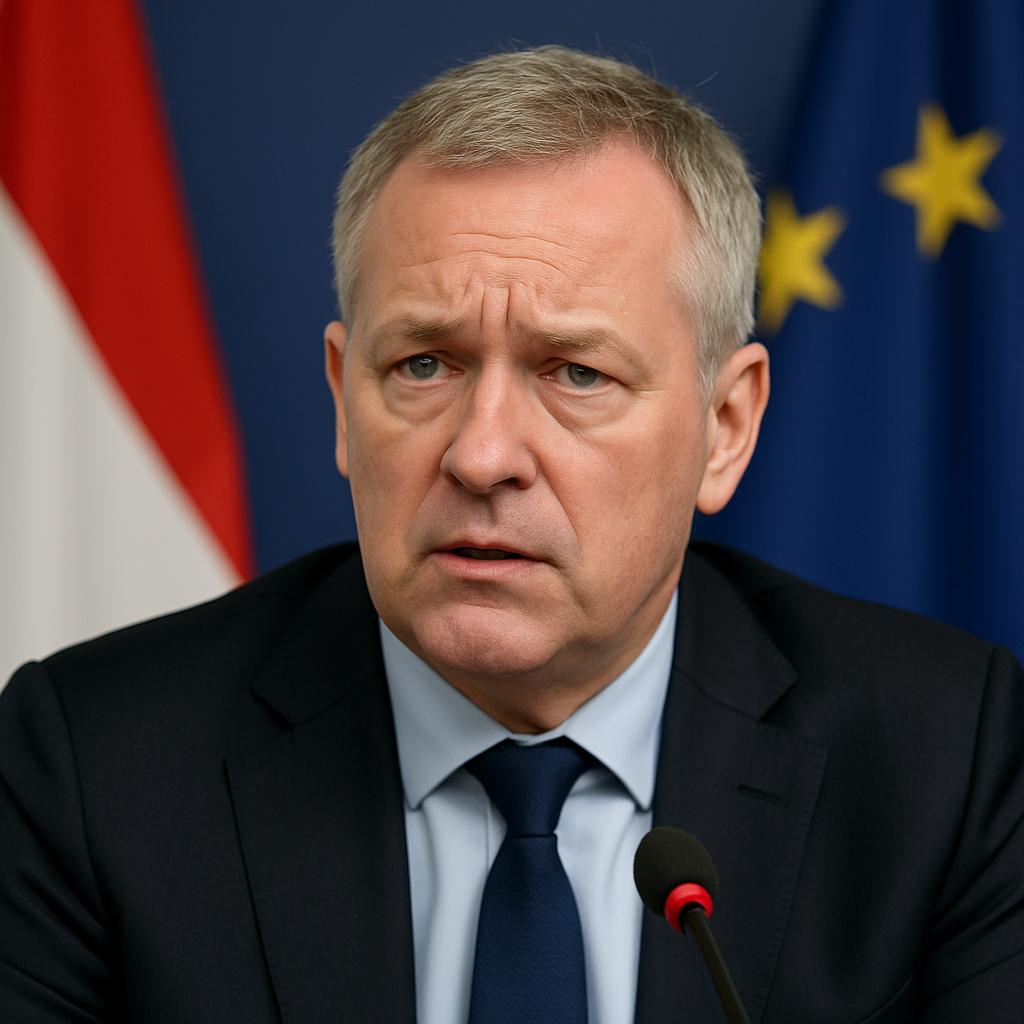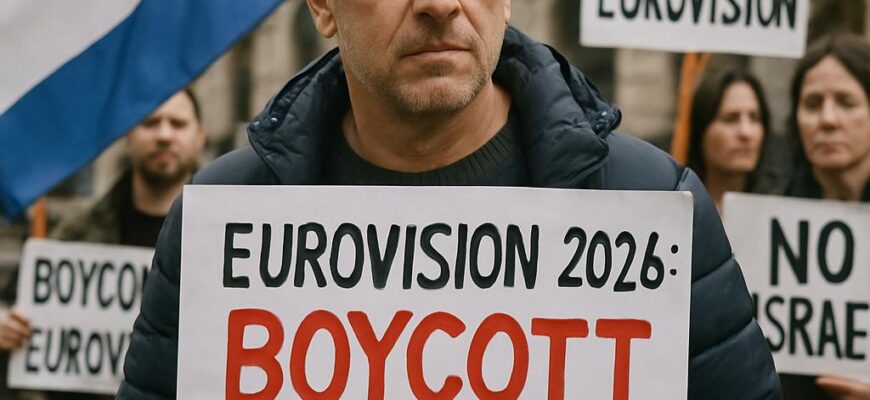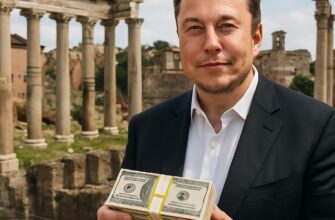This article examines reports that The Netherlands joins the boycott of Eurovision 2026 due to Israel’s participation, and it maps the political, cultural, and practical fallout of such a decision. The story sits at the intersection of music and geopolitics — a place where rhythms meet real-world consequences — and the coming months will test the European Broadcasting Union’s claim that the contest can remain apolitical.
- How the story surfaced and what it means right now
- Why Eurovision is fertile ground for politics
- Precedents and recent history
- What would motivate the Netherlands to boycott?
- Public pressure and artist activism
- How the EBU is likely to respond
- Legal and contractual complications
- Who stands to gain — and who will lose — from a Dutch boycott?
- Reactions in the Netherlands: politics, media, and music industry
- Voices from the creative community
- The international ripple effects: alliances, splintering, and alternatives
- Scenarios to watch
- Economic consequences for host cities and broadcasters
- What the artists can do: options beyond the contest
- Can music remain separate from politics in 2026?
- What fans should watch in the coming months
- Possible paths forward: negotiation, compromise, or escalation
- Wrapping up the implications for 2026 and beyond
How the story surfaced and what it means right now
In recent days, Dutch media and social channels have been ablaze with claims that the Netherlands has withdrawn from Eurovision 2026 in protest of Israel’s presence in the contest. Whether framed as a principled boycott or a political statement, the decision—if confirmed—would mark one of the clearest examples in years of a broadcaster using cultural tools to make a geopolitical point.
Because the Eurovision Song Contest has historically been careful to avoid open political confrontation, any official Dutch withdrawal will trigger immediate questions: Who authorized the move — government, public broadcaster, or civil society groups? What will the EBU do in response? For fans and artists, the announcements have created uncertainty that could shape lineups, promotional calendars, and planning for months to come.
Why Eurovision is fertile ground for politics
Eurovision is not just a song contest; it is a large public spectacle that brings tens of millions of viewers together under a single banner. That visibility makes it a powerful platform for national identity, soft power, and symbolic protest. Organizers insist on political neutrality, but neutrality and politics rarely coexist comfortably in events that celebrate nation-states.
Historical precedent shows that contest entries, broadcasts, and even participation decisions have occasionally become proxies for broader disputes. The unique mix of live television, national pride, and international attention means a decision by one broadcaster can reverberate across the continent in ways that a quieter diplomatic move would not.
Precedents and recent history
Recent years demonstrated that the EBU does not operate in a political vacuum. In 2022 the organization banned Russia from participating after the invasion of Ukraine — a high-profile example of decisions shaped by geopolitics. That move set a new tone: political events beyond the contest can influence membership and eligibility.
Similarly, broadcasters have withdrawn from Eurovision in the past for political or financial reasons, though each case has its own context. Those precedents are instructive because they reveal the limited toolkit available to the EBU when political tensions escalate around a contestant or a member broadcaster.
What would motivate the Netherlands to boycott?
A boycott by the Netherlands would likely be rooted in a mixture of moral, political, and public-relations considerations. Public outrage over state policies elsewhere can make cultural engagement feel like complicity in the eyes of some groups, and broadcasters sometimes respond to sustained pressure from civil society, artist collectives, or members of parliament.
Domestic politics matter, too. A broadcaster that depends on public funding or that is overseen by politically appointed boards can find itself caught between editorial independence and governmental nudges. In a highly polarized climate, choosing to sit out a cultural event can be seen as taking a stand that resonates beyond borders.
Public pressure and artist activism
Artists and activist groups can mobilize quickly online, and calls for boycotts often follow high-profile campaigns. Singers and songwriters sometimes choose to speak out, either urging non-participation or asking for conditions — such as performances tied to humanitarian causes — before they’ll participate. In the Netherlands, a country with a robust tradition of protest and public debate, such pressures can carry weight.
I’ve attended several Dutch national selection shows and festivals where artists discussed politics openly; those conversations often spill into the public sphere. Musicians tend to be both collaborators and critics of state policy, and their influence is rarely predictable.
How the EBU is likely to respond

The EBU has a formal structure and a ruleset designed to preserve the contest’s broadly nonpolitical character. An official Dutch withdrawal would force the union to balance enforcement of its rules with damage control. Sanctions, public statements, or expedited mediation are all possible responses, depending on the situation.
In practical terms, the EBU must consider contracts, broadcasting rights, and production logistics. The organization also has to weigh the reputational costs of appearing to allow politics to displace participation without consequence versus the diplomatic fallout of sanctioning a high-profile member.
Legal and contractual complications
Broadcasters sign licensing and participation agreements with the EBU. Pulling out abruptly could lead to contractual penalties or loss of future hosting privileges. At the same time, the EBU cannot easily compel a state-funded broadcaster to participate if the broadcaster’s leadership or its political overseers decide otherwise.
These legal entanglements mean that even a single withdrawal can lead to protracted negotiations or an uneasy stalemate. Both sides have incentives to avoid escalation, but when principles clash with contracts, the resolution rarely comes quickly.
Who stands to gain — and who will lose — from a Dutch boycott?
The consequences of a boycott are uneven. The Dutch public broadcaster could face domestic political backlash and financial consequences, while artists lose a stage and promotional opportunities. The EBU loses a participant and one of its larger, experienced delegations. Fans suffer the immediate loss of a national entry they may have been emotionally invested in.
On the flip side, boycott supporters see potential gains in the form of moral clarity and international attention to their cause. Whether those gains translate into policy shifts or sustained public debate is an open question, but the symbolic payoff can be significant.
| Stakeholder | Potential immediate impact | Longer-term consequence |
|---|---|---|
| Dutch broadcaster | Reputational scrutiny; contractual complexity | Funding debates; altered relationship with EBU |
| Artists | Lost international exposure | Career trajectory affected; possible solidarity gigs |
| EBU | Challenge to apolitical mandate | Precedent for future exclusions or withdrawals |
| Fans | Disappointment and division | Potential shifts to alternative events |
Reactions in the Netherlands: politics, media, and music industry
Within the Netherlands, a dispute over Eurovision participation would cut across party lines, media outlets, and cultural institutions. Some politicians could applaud a moral stand, while others criticize the politicization of a cultural event. Editors and columnists would likely debate whether culture should be wielded as a tool of foreign policy.
The music industry would face difficult choices. Record labels and managers aim to secure exposure for their acts, and Eurovision can be a career accelerant. Yet artists sympathetic to the motives behind a boycott might welcome its symbolic message, even as they feel personally disadvantaged.
Voices from the creative community
Musicians often worry that being drawn into political disputes can overshadow the art itself. At the same time, high-profile performers have used Eurovision to call attention to causes: humanitarian messages, environmental causes, and civil-rights themes have appeared on stage when artists chose to take risks.
In my time covering music events, I’ve seen artists face immediate backlash for taking stands; I’ve also seen boycotts and alternative concerts galvanize audiences into action. Cultural activism rarely follows a straight line — its effects are diffuse, and sometimes surprising.
The international ripple effects: alliances, splintering, and alternatives
If the Netherlands’ withdrawal encourages other broadcasters to follow suit, the contest could face a broader legitimacy crisis. A cascade of boycotts would strain the EBU’s capacity to deliver a representative pan-European event and might encourage the formation of parallel shows with competing narratives.
Alternatively, a single notable withdrawal could embolden fan-driven alternatives — charity concerts, online festivals, or collaborative events that bring artists together while explicitly addressing the underlying political issues. These alternatives often play to smaller audiences but can be more agile and message-focused.
Scenarios to watch
Several plausible scenarios exist: one, the Netherlands remains the lone boycott, making a symbolic statement but leaving the contest intact; two, multiple countries join, forcing the EBU into crisis mode; three, a negotiated compromise is reached, possibly involving conditional participation or special programming. Each path has different consequences for the contest’s credibility and long-term viability.
Which scenario unfolds depends on diplomatic backchannels, domestic political pressures, and the EBU’s appetite for compromise. Fans should expect rapid developments and an unpredictable timeline.
Economic consequences for host cities and broadcasters
Eurovision stimulates tourism, hires local crews, and brings television revenues to the host city. A significant boycott could change budget forecasts and planning assumptions, particularly if it affects ticket sales or sponsorships. Organizers count on a predictable slate of countries when they plan venues, security, and logistics.
For broadcasters, the contest is a predictable programming event with a high viewer turnout. Missing out on that spotlight can mean financial losses and longer-term branding consequences, especially for nations that rely on cultural exports as part of their soft-power strategy.
What the artists can do: options beyond the contest

Artists affected by a boycott have several paths: they can support the boycott publicly, stage alternative concerts focused on humanitarian relief, or use their platforms to push for dialogue and understanding. Each choice carries artistic and career trade-offs, and none is universally right.
- Host or participate in benefit concerts to raise funds for affected populations.
- Create joint recordings or online performances with artists from other countries as a show of solidarity.
- Engage in open letters or public statements to clarify their positions and explain their choices to fans.
These options allow artists to stay engaged without necessarily endorsing political positions they may find complicated or uncomfortable. In past cultural disputes, such creative alternatives have sometimes led to meaningful conversations that outlasted the initial controversy.
Can music remain separate from politics in 2026?
The tensions between art and politics are as old as public spectacle itself. In a century marked by intense global conflicts and instantaneous media, expecting music to be entirely insulated from politics is probably unrealistic. That said, the EBU and member broadcasters can still aim for transparency, consistent rules, and predictable processes to mitigate flashpoints.
If the Netherlands’ decision becomes a defining moment, it will force a reconsideration of the premises underpinning Eurovision: Is it primarily a competition, a celebration of cultural exchange, or a stage for national self-expression? The answer influences whether organizers double down on nonpolitical rules or accept politics as part of the show.
What fans should watch in the coming months
Fans and industry watchers should monitor official statements from the Dutch public broadcaster, the EBU, and relevant government ministries. Pay attention to artist statements and the dates for national selection events — cancellations or changes there will be telling. A steady drumbeat of clarifying announcements usually precedes formal decisions.
Social media will play an outsized role. Watch for coordinated campaigns, hashtags, and cross-border appeals from artists and activists. The modern media cycle moves fast, and narratives can solidify quickly once a controversy enters the public sphere.
Possible paths forward: negotiation, compromise, or escalation
Several avenues could resolve the standoff. Negotiation mediated by the EBU or third parties could ease tensions. Compromise measures — such as conditional participation tied to humanitarian measures or symbolic acknowledgments — might defuse pressure while preserving the contest’s structure. Escalation, however, risks broader boycotts and long-term damage to Eurovision’s brand.
For each option, timing matters. A late withdrawal compresses planning timelines and makes alternatives harder to execute. An early, clear decision leaves more room for creative responses, whether logistical or diplomatic.
Wrapping up the implications for 2026 and beyond
If the Netherlands does proceed with a boycott, the immediate impact will be felt across broadcasting desks, artist rosters, and fan communities. Beyond the immediate drama, the episode could force a deeper conversation about whether international cultural events can, or should, maintain strict nonpolitical rules in a world where political questions saturate daily life.
Whatever unfolds, this situation highlights the fragile balance between cultural exchange and political conscience. Eurovision has survived many tests; whether it adapts, resists, or fractures will depend on the decisions of broadcasters, artists, and audiences in the months ahead.
For ongoing coverage and analysis of how technology, media, and cultural events intersect with geopolitics, check our reporting on related developments at https://themors.com/technology-innovation-news/. If you want more perspectives and follow-ups, visit our main site and explore other materials at https://themors.com/.









